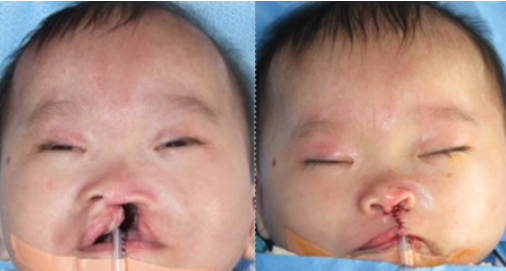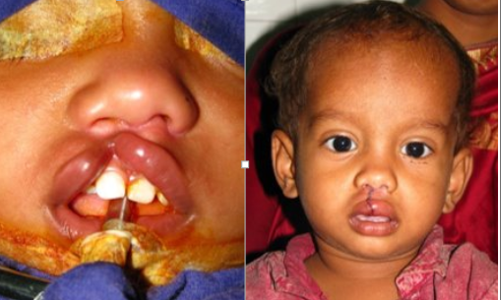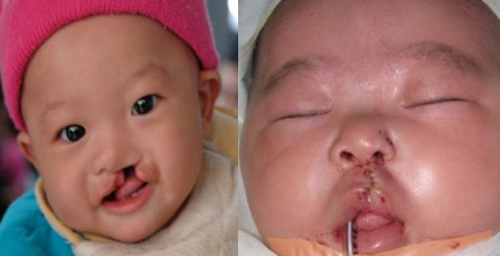Facial clefts occur in about 1 of every 600 births in the United States, making them one of the most common birth defects. Approximately 6800 newborns every year in the US are born with a facial cleft. Most doctors and researchers agree that the causes of clefts are multifactorial and may include a genetic predisposition as well as environmental issues such as drug and alcohol use, smoking, maternal illness, infections, or lack of folic acid. Sometimes a cleft is associated with a syndrome that involves abnormalities of other body parts.

A cleft lip and/or cleft palate occur when certain body parts and structures do not fuse together during the first few months of pregnancy. A cleft lip is an opening in the lip, which can extend into the gum line and the base of the nose. It can be on one side (unilateral) or both sides (bilateral). A cleft palate can occur with a cleft lip or also can occur on its own. The palate is the roof of the mouth and is made up of both the hard and soft palate. Babies with cleft lip alone usually have few problems feeding. A baby with a cleft palate may have more feeding difficulties and need special bottles and nipples (as well as careful positioning) to feed adequately.
In order to address cleft defects in children, parents must work with a large team of providers to support their child’s treatment process. This team works together cohesively to ensure that proper treatment takes place in a timely manner.

Team members include:
• Perinatologist and a prenatal team
• Plastic and Reconstructive Surgeon
• Pediatric Dentist
• Speech-Language Pathologist
• Audiologist
• Geneticist
• Ear Nose and Throat Doctor, or ENT.
• Pediatrician
• Psychologist
• Social Worker, or Mental Health Specialist
• Ophthalmologist
Care for a young child with a facial cleft should start as early as possible. Immediately after birth, a lactation specialist and pediatrician will see the baby to ensure that feeding is adequate. Within days or the first week of like, the baby will be evaluated by other members of the craniofacial team, such as speech therapy and plastic surgery. This is to ensure that the baby is eating and growing appropriately, and to outline a future surgical treatment plan. A timeline will be established depending on the specific type of cleft and any other medical problems the infant may have.
As a parent, the idea of traveling for medical treatment can be overwhelming and incredibly disruptive for families. Over the last few years the Flathead has been expanding its pediatric specialty department, and we are excited to have the complete Montana Children’s Medical Center available to support families in 2018.

Dr. Michelle Spring is a board-certified, fellowship-trained plastic surgeon. She spent one year training as the Webster Fellow with a nonprofit organization called ReSurge (formerly Interplast). She trained under many craniofacial surgeons to provide free cleft lip and palate surgery to children in underserved countries. She continues to do this work as both a team leader and a lead surgeon on trips abroad, most recently in Kathmandu, Nepal and Ho Chi Minh City, Vietnam. Dr. Spring is Chair of Surgery and the medical director at Mountain West Plastic Surgery in Kalispell Montana, where she and her partner Dr. Michael Hromadka specialize in cutting edge cosmetic and aesthetic procedures, but also serve the community as reconstructive surgical specialists. Through this integrated aesthetic and reconstructive plastic surgery practice, the board certified surgeons at Mountain West Plastic Surgery are able provide many components of the complex and diverse field of plastic surgery.
Most parents are concerned about what their babies will look like before and after surgery. Below are pictures of children before and directly after a surgical cleft lip closure. This surgery takes approximately 2 hours and the effect is immediate. Education is an essential process for a family with a child that has a cleft defect, Dr. Spring is always happy to consult with parents early on in order to support them through this process.
To make an appointment with Dr. Michelle Spring at Mountain West Plastic Surgery call 406-756-2241 or request a consultation.
Online resources:

Leave a Reply